Gran Torino
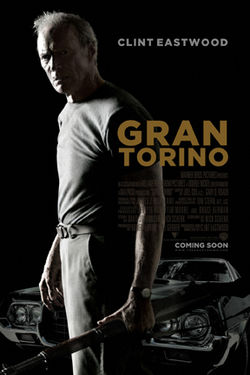
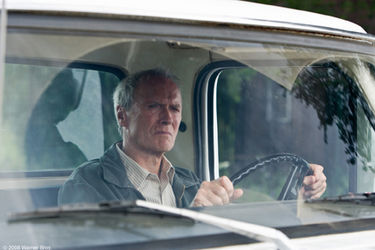 There is perhaps no other actor who could have played the character. Walter may be outspoken, but he usually lets his disapproving glare do all the talking that needs to be said. The film opens at the funeral of his wife, and we see Walter eyeing his grandchildren who show up dressed in their street clothes and texting friends during the service. He lives in a world of respect, but he doesn't seem to give that respect very freely. His family and grandchildren embarrass him, and he doesn't like seeing what his neighborhood has become as he sits on the front porch, drinking beer, with his dog (his only companion now that he's alone) by his side. The streets are filled with gang members at war with one another, and he glares silently at the ethnic families moving in, including the Asian family that lives next door. Walter lives in a closed off world, angry at everyone and anything that is not him. He freely blurts out racial slurs and insults. Even when he begins to get closer to the young woman who lives next door, Sue (Ahney Her), he openly refers to her as "Dragon Lady". Fortunately, Sue is armed with a sharp sense of humor to combat his verbal barbs, and can speak for her family since many living with her don't speak English.
There is perhaps no other actor who could have played the character. Walter may be outspoken, but he usually lets his disapproving glare do all the talking that needs to be said. The film opens at the funeral of his wife, and we see Walter eyeing his grandchildren who show up dressed in their street clothes and texting friends during the service. He lives in a world of respect, but he doesn't seem to give that respect very freely. His family and grandchildren embarrass him, and he doesn't like seeing what his neighborhood has become as he sits on the front porch, drinking beer, with his dog (his only companion now that he's alone) by his side. The streets are filled with gang members at war with one another, and he glares silently at the ethnic families moving in, including the Asian family that lives next door. Walter lives in a closed off world, angry at everyone and anything that is not him. He freely blurts out racial slurs and insults. Even when he begins to get closer to the young woman who lives next door, Sue (Ahney Her), he openly refers to her as "Dragon Lady". Fortunately, Sue is armed with a sharp sense of humor to combat his verbal barbs, and can speak for her family since many living with her don't speak English. Gran Torino is a quiet meditation on how Walter slowly opens himself, not just to those around him, but also to himself in a way. He's shut himself away from everyone because there's not a lot of things he likes about himself, though he'll never admit it. A young Priest (Christopher Carley) tries to reach him and talk him into going to confession at his church, but it is really the relationship that slowly builds between Walter and Sue's brother Thao (Bee Vang) that allows him the opportunity to open up for what seems to be the first time in his life. They first meet when Thao is pressured by some local gang members to break into Walter's garage and steal his prized vintage 1972 Gran Torino car. The attempt is foiled, and when the gang members return to pressure Thao some more and threaten Sue, Walter scares them away with his shotgun. Walter wasn't trying to help Thao, he just wanted the punks off his lawn. Still, the family is grateful, and a shaky union is started when Thao offers to do work for Walter to make up for attempting to steal his car. The bizarre mentor/friend relationship that builds between this closed off and bitter racist, and this young man who can hardly speak or think for himself makes up the heart of the film.
Gran Torino is a quiet meditation on how Walter slowly opens himself, not just to those around him, but also to himself in a way. He's shut himself away from everyone because there's not a lot of things he likes about himself, though he'll never admit it. A young Priest (Christopher Carley) tries to reach him and talk him into going to confession at his church, but it is really the relationship that slowly builds between Walter and Sue's brother Thao (Bee Vang) that allows him the opportunity to open up for what seems to be the first time in his life. They first meet when Thao is pressured by some local gang members to break into Walter's garage and steal his prized vintage 1972 Gran Torino car. The attempt is foiled, and when the gang members return to pressure Thao some more and threaten Sue, Walter scares them away with his shotgun. Walter wasn't trying to help Thao, he just wanted the punks off his lawn. Still, the family is grateful, and a shaky union is started when Thao offers to do work for Walter to make up for attempting to steal his car. The bizarre mentor/friend relationship that builds between this closed off and bitter racist, and this young man who can hardly speak or think for himself makes up the heart of the film.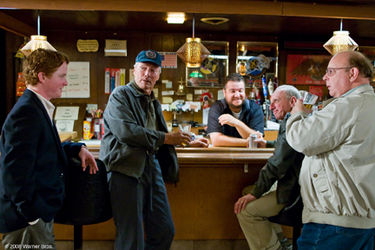 And yet, as the film went on, I came to the slow realization that this heart was somewhat mechanical. The screenplay by Nick Schenk often seems built around coincidences, with Walter just happening to be at the right place at the right time for things to happen. Each time Sue or Thao are surrounded by gang members, Walter just happens to be driving by to scare the hoodlums away. The movie also settles into a cycle for the first hour or so. Walter has a run-in with the family next door, has a run-in with the Priest, has a run-in with some thugs, and repeats until the plot of him bonding with Thao kicks in. I found the movie repeating the same ideas and dialogue in each scene. I appreciated the quiet and laid back nature of the storytelling, but at the same time, it's a bit too aimless for its own good. There are even certain scenes where the characters seem to be standing around, waiting for the expected climax to happen. I won't go into too much detail here, but I do have to admit the way the final moments are played out does not betray the nature of the film and was certainly not what I entirely expected. I mean this in a good way.
And yet, as the film went on, I came to the slow realization that this heart was somewhat mechanical. The screenplay by Nick Schenk often seems built around coincidences, with Walter just happening to be at the right place at the right time for things to happen. Each time Sue or Thao are surrounded by gang members, Walter just happens to be driving by to scare the hoodlums away. The movie also settles into a cycle for the first hour or so. Walter has a run-in with the family next door, has a run-in with the Priest, has a run-in with some thugs, and repeats until the plot of him bonding with Thao kicks in. I found the movie repeating the same ideas and dialogue in each scene. I appreciated the quiet and laid back nature of the storytelling, but at the same time, it's a bit too aimless for its own good. There are even certain scenes where the characters seem to be standing around, waiting for the expected climax to happen. I won't go into too much detail here, but I do have to admit the way the final moments are played out does not betray the nature of the film and was certainly not what I entirely expected. I mean this in a good way.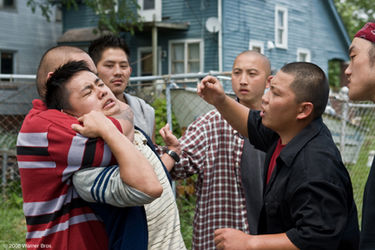 Despite my mixed feelings on the script, there's no denying there's quite a bit to like here. Gran Torino does not exactly feature a classic Eastwood performance, but he is certainly in his element here, and I hope he gets to act in at least one other film after this. Surprisingly, the performances that stood out in my mind was not his, but rather Ahney Her and Bee Vang. They're both newcomers with no previous acting credits, but they both give such emotional performances, especially Ahney Her as the sharp-tongued yet understanding Sue. I wanted to see more of her, but she unfortunately disappears once Vang's Tao takes center stage, until the plot requires her to enter the story again and create a crisis. I wanted these characters and these performances to break free of the mechanical and almost clockwork plotting of the script. They both have great individual moments, but are forced to remain rigid.
Despite my mixed feelings on the script, there's no denying there's quite a bit to like here. Gran Torino does not exactly feature a classic Eastwood performance, but he is certainly in his element here, and I hope he gets to act in at least one other film after this. Surprisingly, the performances that stood out in my mind was not his, but rather Ahney Her and Bee Vang. They're both newcomers with no previous acting credits, but they both give such emotional performances, especially Ahney Her as the sharp-tongued yet understanding Sue. I wanted to see more of her, but she unfortunately disappears once Vang's Tao takes center stage, until the plot requires her to enter the story again and create a crisis. I wanted these characters and these performances to break free of the mechanical and almost clockwork plotting of the script. They both have great individual moments, but are forced to remain rigid.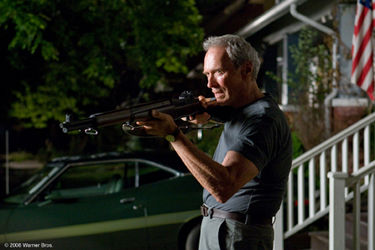
See the movie times in your area or buy the DVD at Amazon.com!






0 Comments:
Post a Comment
<< Home